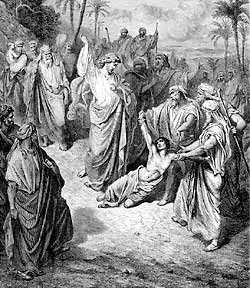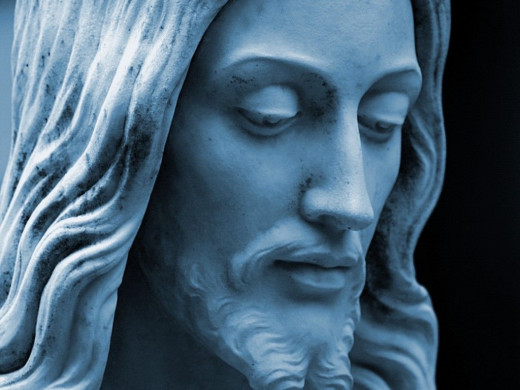Bacon and Introverts: Jesus As A Literary Character

Jesus as a character
Jesus of Nazareth has been continually pinned beneath the critical gaze of historians, scientists, and philosophers. Yet he is surprisingly neglected by the realm of literary analysis and is rarely, if ever, analyzed as a character in a story.
Well, I'm nothing if not noncontroversial, so why don't we tackle that right here and now? After all, the Gospels are first and foremost a story, and like any story, their quality rests on the likability of the main man. And who is more qualified to determine this than the realm of literary analysis? Stripped of all preconceived notions, what is this Jesus actually like?
For the sake of time, I'm only going to focus on the story of Jesus given in Mark, for two reasons. One, it's currently considered to be the first Gospel written and is therefore thought to be the most accurate (and therefore uncolored by alleged "legendary" details and so forth). Two, it's the shortest. And I'm lazy.
Mark gives readers a decent sketch of the personality of this controversial character, and yet, as we shall see, these details shine light on but a single sliver in an elaborate stained glass window.

Introverted
What? Isn’t this guy who relishes loud debates, conducts performances of miraculous healings and thrives on being the center of attention? Actually, a close look at Jesus’s ministry reveals a quiet and withdrawn nature. When he is placed in the spotlight, it is by powers beyond his control.
His public ministry begins with his encounter with a man in the temple who is gripped with an “unclean spirit.” This could be a euphemism for some mental illness or it could literally mean that he was plagued by Satan’s minions. What exactly was wrong with him could be debated by people more qualified and less lazy than me; my point is simply that Jesus’s words liberate the man from his ailment:
“Jesus rebuked him and said: ‘Quiet! Come out of him!’ The unclean spirit convulsed him and with a loud cry came out of him” (New American Bible, 1 Mk: 25-26).
Christians interpret this as a compassionate response to suffering, but doesn’t it seem more like embarrassment? Jesus wants to shut the guy up because he is labeling him as the “holy one of God” and no doubt drawing a lot of raised eyebrows.
I mean, it’s pretty clear that Jesus is a man with a mission, but he just as clearly wants to pursue that mission on his own terms. And this jar of nuts calls him out before he is ready. After startling everyone with this “show,” Jesus, like an introvert, attempts to melt into obscurity for a few days—to no avail:
“…it was impossible for Jesus to enter a town openly…people kept coming to him from everywhere…Jesus withdrew toward the sea…A large number of people followed …” (1 Mk: 45; 3 Mk: 7)

Compassionate
But here's an interesting turn:
Jesus’s introverted tendencies are thrown into contrast by his unexpected willingness to help when people humbly ask for his assistance. After the demoniac’s curing, for example, he goes to a friend’s house to escape the crowds. Instead, he is bothered about Simon’s in-laws. Rather than telling his buddy to buzz off because he's tired, Jesus silently helps with no questions asked:
“Simon’s mother-in-law lay sick with a fever. They immediately told him about her. He approached, grasped her hand, and helped her up. Then the fever left her…” (1 Mk: 30-31).
He responds with the same quietness when he is approached by a leper:
“A leper came…and…begged him…‘If you wish, you can make me clean.’ Moved out of pity, he stretched out his hand, touched him, and said to him, ‘I do will it. Be made clean…’” (1 Mk: 40-41).
The fact that Jesus does not force himself on others, but waits for them to ask when they are ready to receive, is a pleasantly surprising trait to discover in someone who can seem rather dismissive at times—which brings us to his final and most unflattering trait:
He really hates bacon
Okay, I actually just mean that he comes across as a bit cocky. Jesus’s confidence in his own powers, coupled with his tendency to take quick action, leads him to act in ways that are, well, kinda inconsiderate. This is best exemplified in the famous story of the possessed man and the swine. Here, Jesus frees another man of an “unclean spirit,” but does so in a way that makes a herd of pigs jump in the ocean (5 Mk: 1-20).
Can you imagine being the owner of those swine? Your entire winter supply of bacon—poof! Sorry, Ma, we'll have to gnaw on broccoli instead this winter. It’s no wonder they asked him to leave town.
Of course, one could argue that Jesus’s lack of concern arises from his cultural background, since most Jews regarded pigs as offensive. (Their loss, am I right? Pass the ham.) Yet one also could wonder why he didn't banish the demon (as he very well could have) in such a way as to leave a man’s livelihood undamaged. And to keep all that beautiful, artery-clogging bacon seawater free and wonderfully bad for you.


The Summit
Are we any closer to understanding Jesus than we were at the beginning of this post? This list is a blend of contradicting traits, after all, and it hardly defines him concretely. I'd say that's what makes him a good character.
Good characters spark controversy. Regardless of how one may personally view him, nobody can accuse this Jesus of lacking that fiery spark that burns within the veins of every memorable character throughout the ages of literature. He has mounted the summits of literary immortality, and his personality contradictions do not hinder the journey.
They only lift him higher.








